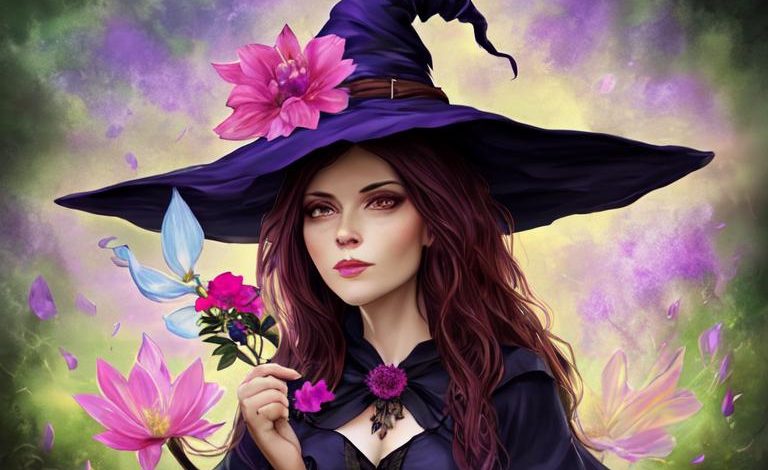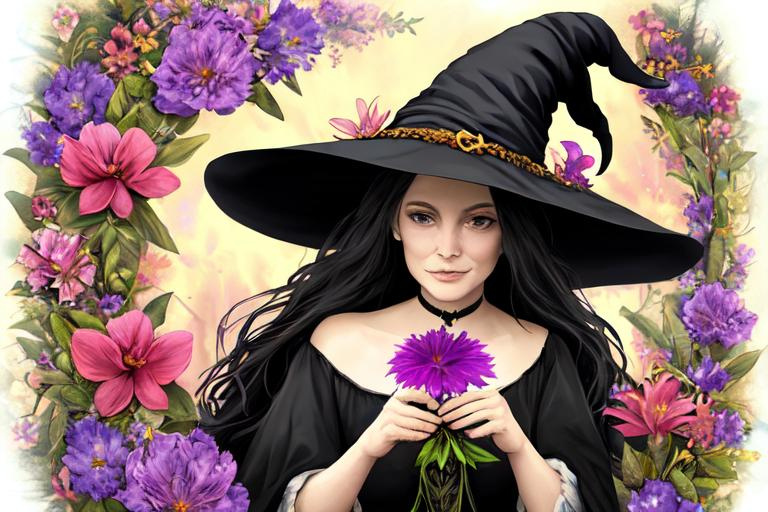
Greetings, fellow witches! Today, we will delve into the enchanting world of herbal magic. As healers, we understand that the power of the natural world can aid us in our work. Herbs have been used for centuries for their healing properties and have been an essential part of the witch’s toolkit.
Herbal magic allows us to connect with the energy and wisdom of the plant kingdom, harnessing their healing properties to promote physical, emotional, and spiritual wellbeing. The use of herbs in spells and rituals can amplify their power and bring about profound transformations.
As witches, we understand that every plant possesses its own unique energy and properties. By understanding these properties, we can use herbs to target specific areas of our lives and work towards our goals. Whether you seek to boost your energy, promote clarity, or attract abundance, there is an herb out there that can aid you in your journey.
In this article, we will explore the correspondences, planetary and elemental energies, and spirit of the plants. We will also discuss safety considerations to keep in mind when working with herbs. So, gather your cauldron, light some candles, and let’s delve into the magical world of herbal healing.
The History of Herbal Magic
The use of herbs for magical and healing purposes has a long and rich history. Many ancient civilizations, including the Egyptians, Greeks, and Romans, utilized the power of plants in their spiritual practices. Herbal magic has been documented in various texts throughout history, including the famous herbal manuscripts from ancient China, Egypt, and Greece.
In medieval Europe, herbalism was considered both a science and an art, and herbalists were highly respected members of society. They were often consulted by royalty and the wealthy for their healing knowledge, and their expertise in using plants for magical purposes was widely recognized. During the Renaissance, interest in herbal magic continued to grow, and many new books on the subject were written and published.
In the New World, indigenous cultures also had a deep connection with the plant world and utilized herbs in their spiritual practices. For example, Native American shamans used various herbs in their healing ceremonies and spiritual rituals, such as sweetgrass for purification and sage for protection. African traditions also had a rich history of using plants in their spiritual practices, such as the use of palo santo and frankincense for purification and protection. Today, herbal magic continues to thrive, and many modern witches and healers use herbs in their spells, rituals, and healing practices.
The Basics of Herbal Magic
 Herbal magic involves working with the energies of plants and their associated spirits. These energies can be used for a wide range of purposes, including healing, cleansing, protection, and manifestation.
Herbal magic involves working with the energies of plants and their associated spirits. These energies can be used for a wide range of purposes, including healing, cleansing, protection, and manifestation.
When working with herbs, it is important to choose the right ones for your needs. Each herb has its own unique properties and energies, and some are better suited for certain purposes than others. For example, lavender is often used for relaxation and stress relief, while sage is commonly used for cleansing and purification.
Before using any herb in your magic, it is important to research its properties and ensure that it is safe for consumption or use in spells. Some herbs can be toxic or have negative side effects, so it is important to exercise caution and use them only as directed.
Preparing and Using Herbal Remedies
Herbal remedies can be prepared in a variety of forms, including teas, tinctures, oils, and salves. Each preparation method has its own unique benefits and uses.
Teas are one of the most common ways to consume herbs for healing purposes. They are easy to make and can be used to address a wide range of issues, from insomnia to anxiety to digestive problems. Simply steep the herbs in boiling water for several minutes, strain, and drink.
Tinctures are concentrated liquid extracts of herbs that are made by steeping the herbs in alcohol or vinegar. They are often used for acute conditions or to support long-term healing. Tinctures can be taken orally or added to other remedies, such as creams or lotions.
Herbal oils and salves are often used topically to treat skin conditions, inflammation, and other issues. To make an herbal oil, simply infuse the herbs in a carrier oil, such as olive oil or coconut oil, for several weeks. To make a salve, combine the infused oil with beeswax and other ingredients, such as essential oils, and apply topically.
Using Herbal Magic in Spells
 Herbs can also be used in spells to support healing and transformation. When using herbs in spells, it is important to choose ones that correspond to the intent of the spell.
Herbs can also be used in spells to support healing and transformation. When using herbs in spells, it is important to choose ones that correspond to the intent of the spell.
For example, if you are casting a spell for love, you might use rose petals, lavender, or jasmine. If you are casting a spell for prosperity, you might use cinnamon, bay leaves, or chamomile. The key is to choose herbs that resonate with your intention and help to amplify the energy of your spell.
Herbs can be used in a variety of spellwork, including candle magic, sachets, and charm bags. For candle magic, you can carve symbols or words into the candle and anoint it with an herbal oil or sprinkle dried herbs around the base. For sachets and charm bags, you can fill a small bag with herbs and other ingredients that correspond to your intent and carry it with you for added support.
Herbal Correspondences
Each herb has its own unique correspondences that can be used to enhance your magic. Here are some common correspondences for a few popular herbs:
- Lavender – peace, purification, protection, love, and tranquility.
- Rosemary – memory, clarity, purification, healing, and protection.
- Sage – wisdom, healing, protection, purification, and longevity.
- Thyme – courage, purification, healing, love, and protection.
- Chamomile – calmness, relaxation, sleep, healing, and purification.
- Peppermint – energy, invigoration, healing, purification, and protection.
- Lemon Balm – happiness, relaxation, love, healing, and purification.
- Yarrow – courage, protection, healing, love, and psychic awareness.
- Eucalyptus – purification, healing, protection, abundance, and cleansing.
- Cinnamon – passion, love, protection, success, and prosperity.
- Ginger – energy, passion, healing, love, and protection.
- Rose – love, beauty, healing, psychic powers, and protection.
- Mugwort – divination, dreaming, protection, psychic powers, and purification.
- Frankincense – spirituality, meditation, purification, protection, and consecration.
- Myrrh – protection, healing, spirituality, purification, and consecration.
- Cedar – grounding, purification, protection, abundance, and healing.
- Juniper – cleansing, protection, healing, love, and psychic awareness.
- Dandelion – courage, divination, healing, wishes, and psychic powers.
- Calendula – prosperity, protection, healing, psychic powers, and love.
- Angelica – protection, purification, healing, visions, and strength.
- Bay Leaf – protection, divination, healing, psychic powers, and prosperity.
- Black Cohosh – protection, love, purification, courage, and strength.
- Catnip – happiness, love, relaxation, beauty, and psychic powers.
- Clover – love, money, success, protection, and abundance.
- Comfrey – healing, protection, growth, stability, and transformation.
- Fennel – courage, purification, protection, abundance, and fertility.
- Garlic – protection, healing, purification, strength, and psychic awareness.
- Hawthorn – protection, love, purification, psychic powers, and growth.
- Hyssop – purification, protection, healing, love, and psychic awareness.
- Jasmine – love, psychic powers, purification, sensuality, and peace.
- Lemon – purification, love, happiness, success, and prosperity.
- Marigold – protection, love, healing, psychic powers, and success.
- Nettle – protection, healing, growth, abundance, and courage.
- Orange – love, happiness, purification, success, and prosperity.
- Patchouli – love, passion, prosperity, purification, and protection.
- Pine – purification, protection, healing, prosperity, and grounding.
- Raspberry – protection, love, healing, psychic powers, and fertility.
- Red Clover – love, protection, healing, fertility, and success.
- Sandalwood – spirituality, meditation, purification, protection, and healing.
- St. John’s Wort – protection, healing, courage, happiness, and psychic powers.
- Sweetgrass – purification, protection, healing, peace, and spirituality.
- Valerian – relaxation, sleep, peace, purification, and protection.
- Vetiver – grounding, purification, protection, healing, and sensuality.
- White Sage – purification, protection, healing, spirituality, and psychic powers.
- Willow – protection, healing, love, divination, and psychic powers.
- Witch Hazel – protection, healing, psychic powers, love, and purification.
- Woodruff – love, protection, healing, psychic powers, and prosperity.
- Ylang-Ylang – love, sensuality, passion, purification, and relaxation.
- Bayberry – prosperity, protection, healing, and abundance.
- Blueberry – protection, prosperity, happiness, and success.
These correspondences can help you choose the right herbs for your spells and rituals. However, it is important to remember that these correspondences are not set in stone and can vary based on your personal experiences and associations with the herbs.
In addition to correspondences, it is also important to consider the planetary and elemental energies associated with each herb. For example, lavender is often associated with the element of air and the planet Mercury, while rosemary is associated with the element of fire and the planet Mars.
By incorporating planetary and elemental energies into your herbal magic, you can amplify the energy of your spells and enhance their effectiveness.
Working with the Spirits of the Plants
 Herbal magic is not just about using the physical properties of the herbs. It is also about working with the spirits of the plants and harnessing their energy and wisdom.
Herbal magic is not just about using the physical properties of the herbs. It is also about working with the spirits of the plants and harnessing their energy and wisdom.
When working with herbs, it is important to cultivate a relationship with the spirits of the plants. This can be done through meditation, prayer, or simply spending time with the plants in nature. By developing a relationship with the spirits of the plants, you can deepen your understanding of their energy and gain insight into how to use them for healing and transformation.
In addition to working with the spirits of the plants, it is also important to honor them and show gratitude for their gifts. This can be done through offerings, such as water, incense, or flowers, or through simply acknowledging their presence and expressing gratitude for their healing energy.
Safety Considerations
While herbal magic can be a powerful tool for healers, it is important to exercise caution and follow safety guidelines when working with herbs.
Some herbs can have negative side effects or interact with medications, so it is important to research their safety and consult with a healthcare provider before using them. Additionally, some herbs can be toxic in high doses or when consumed in certain forms, such as essential oils.
It is also important to source your herbs from reputable suppliers and to ensure that they are free from contaminants or pesticides.
A Simple Love Spell Using Herbs
Here is a simple spell to make that special someone fall in love with you.
Items:
- dried rosemary
- dried thyme
- dried basil
- A glass bowl
- A Lighter
Spell:
1. Place the herbs inside a small glass bowl.
2. Burn the herbs inside the bowl while chanting the following spell
By the power of the elements and the energy of the universe,
I call upon the forces of love to bring me (insert name of the person) into my life.
May our paths cross, our hearts connect, and our souls align.
May the universe conspire to bring us together in love and harmony.
So mote it be.
Final Thoughts
Herbal magic is a powerful tool for healers and witches alike. By working with the energies of plants, we can promote healing, transformation, and spiritual growth. However, it is important to exercise caution and follow safety guidelines when working with herbs.
By cultivating a relationship with the spirits of the plants and honoring their gifts, we can deepen our understanding of their energy and gain insight into how to use them for healing and transformation.
Whether you are a seasoned herbalist or just beginning to explore the world of herbal magic, there is always more to learn and discover. By continuing to explore the energy and properties of different herbs, we can enhance our craft and deepen our connection to the natural world.




